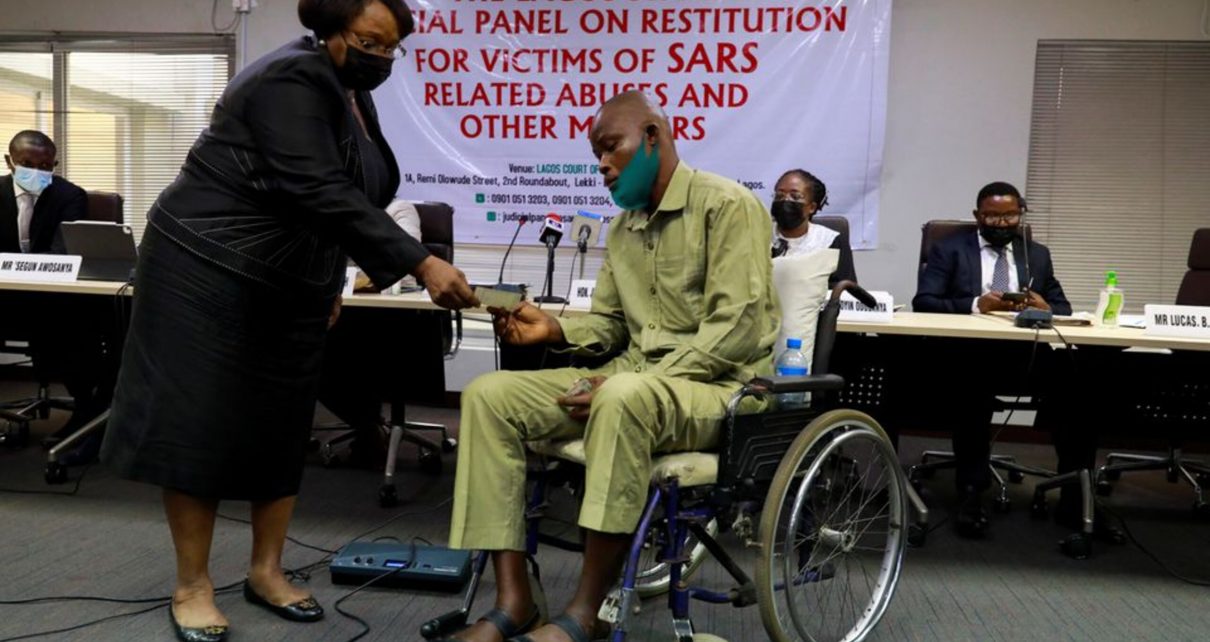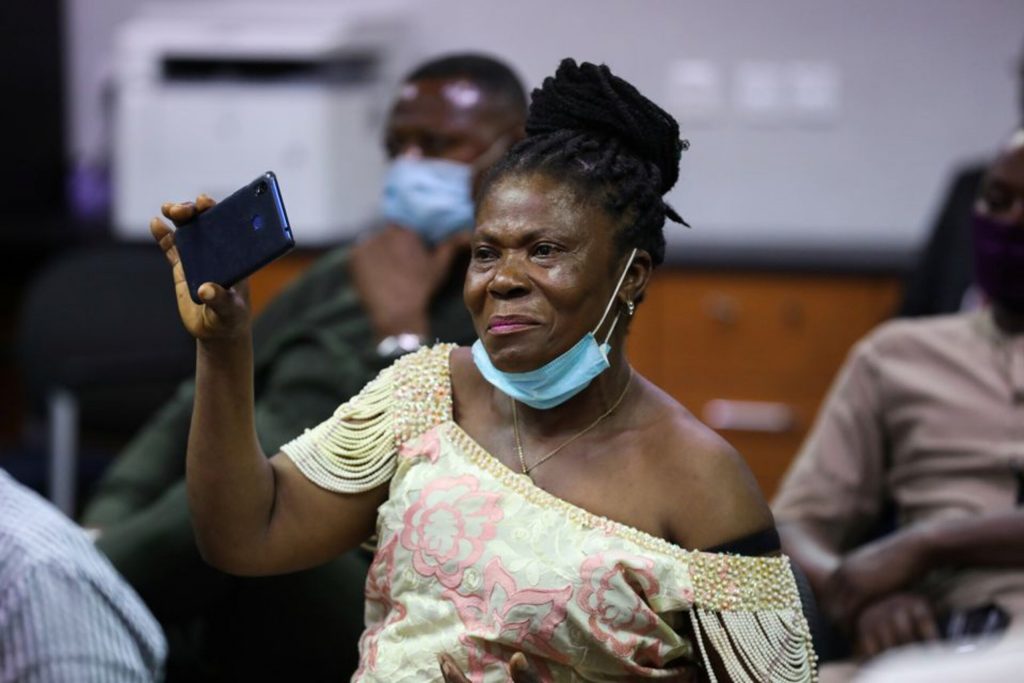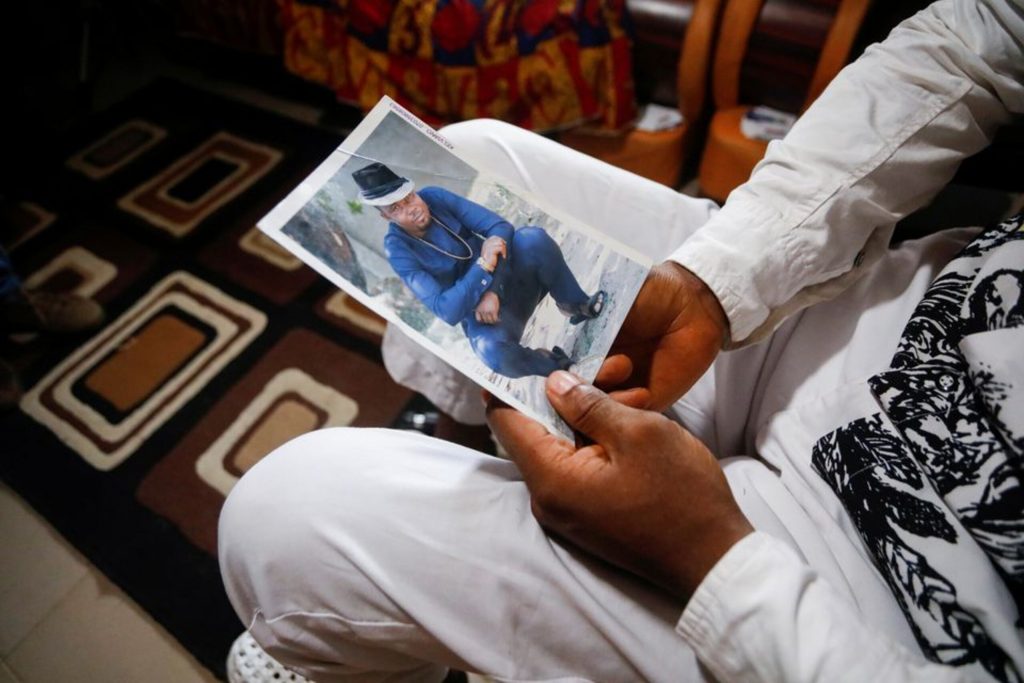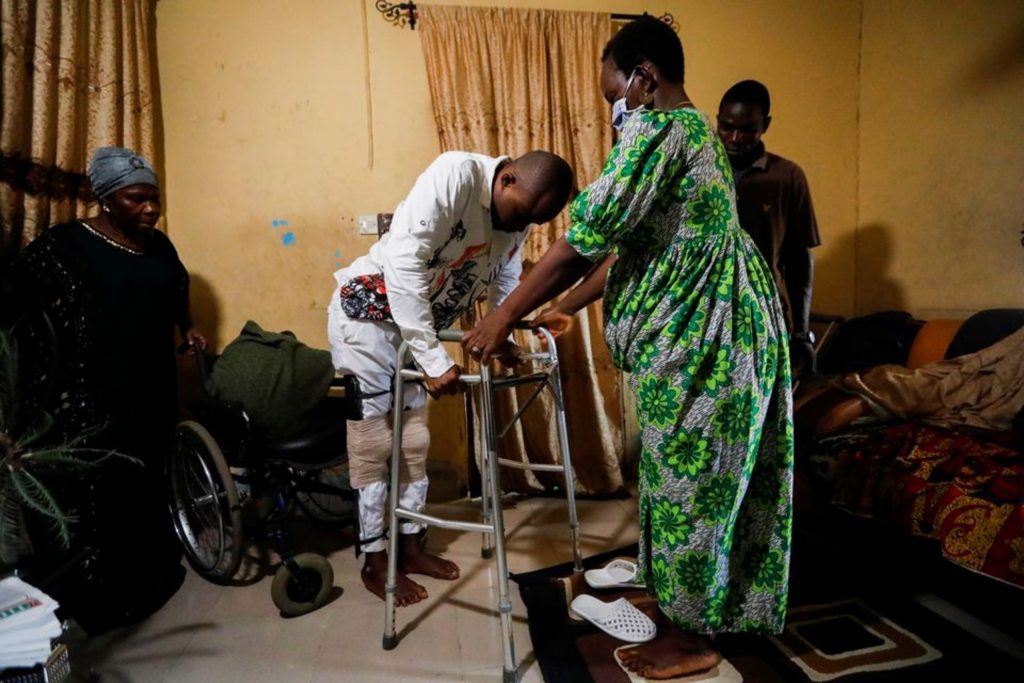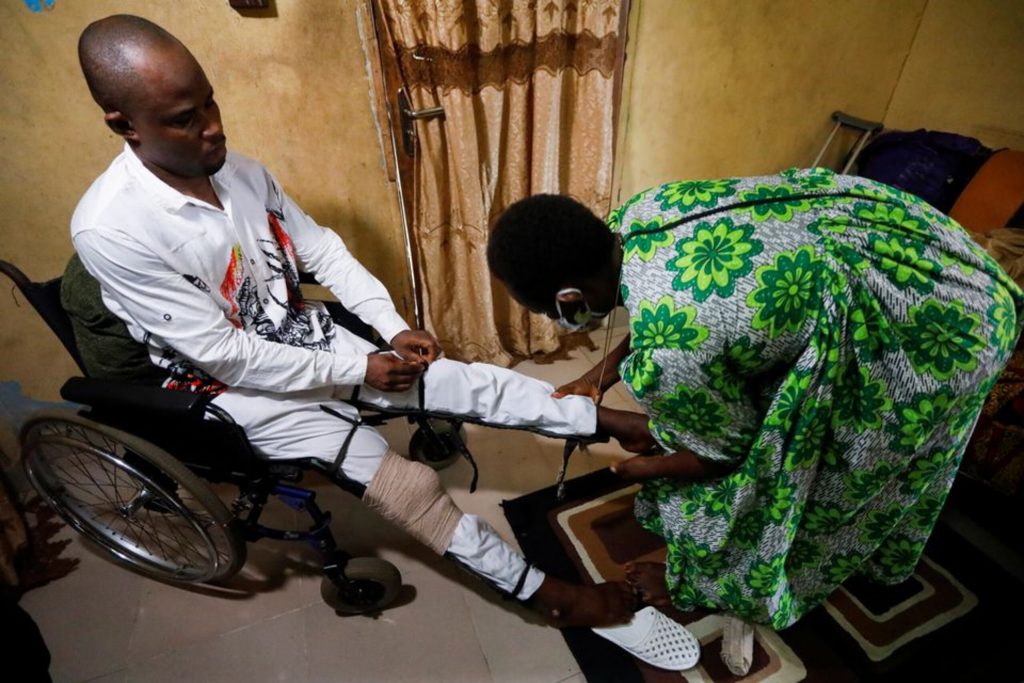By Alexis Akwagyiram
Ndukwe Ekekwe was furious when he heard how much compensation a judicial panel had awarded him after finding that members of an elite Nigerian police unit tortured him in custody following a raid on his phone accessories shop worth 7,500,000 naira ($18,000).
The night after his arrest, he said, officers took him back to the store and pushed him from a second floor balcony, leaving him paralysed from the waist down and struggling to make ends meet.
“I sold my land, all my property, my goods!” he shouted.
During the hearings, the officer who led the operation disputed Ekekwe’s account of the balcony incident, saying he jumped while trying to escape. Lagos state police did not respond to requests for comment on the case.
After the months-long process concluded on May 11, a friend pushed Ekekwe’s wheelchair out of the hearing room as his lawyer yelled after him to calm down and be grateful.
His mother followed, clutching a pack of adult diapers for her 35-year-old son and sobbing over what she considered a paltry sum.
“Is it for treatment? Is it for food? Is it for taking care of him?”
Ekekwe’s case, which Reuters has followed, is one of more than 2,000 being heard by panels set up across Nigeria to investigate allegations of police brutality.
The investigations were a core demand of thousands of protesters who wanted a police unit called the Special Anti-Robbery Squad (SARS) disbanded. They said it was responsible for extortion, torture and extra-judicial killings.
The demonstrations in October were some of the biggest for decades in Africa’s most populous country, and at times turned violent. The police disbanded SARS, but denied most accusations made against the unit.
Six months later, some campaigners and complainants say they are still waiting for justice.
Hearings have been slow, some victims complain of inadequate compensation and officers accused of carrying out abuses go unpunished, said Rinu Oduala, one of two activists invited to join the Lagos panel when it was convened in October.
She left less than four months later, decrying what she said was a sham.
“There is a lot of frustration, and there is a lot of anger,” Oduala told Reuters. “Justice is not being meted out.”
The panels do not have the power to bring charges against officers found to have committed abuses.
A ministry of justice spokesman said it supported the panels and would allow justice to take its course. The information ministry declined to comment on the panels and punishment of police officers.
A spokesman for the Police Service Commission (PSC), a government agency that oversees disciplinary matters, also declined to comment for this story.
In a statement posted on its website on May 11, it said it had received a report from a civil society group that called for police officers identified by victims to be brought to justice.
“The report contained a lot of allegations and information which the Commission will need to verify,” it said, adding that it would continue to ensure that the police force “operates within defined rules and regulations”.
As anger simmers, armed gangs have launched attacks in recent months on police officers and burned down police stations in southern states where 12 officers were killed over a single weekend in May.
Such attacks add to the security challenges confronting the government, which faces public unease over mass kidnappings-for-ransom in the northwest and a decade-long Islamist insurgency in the northeast. read more
“People are taking the law into their own hands and taking extreme options, such as setting up vigilante groups,” said Clement Nwankwo, who heads the Abuja-based Policy and Legal Advocacy Centre think-tank. “Unemployment is incredibly high; the economy is poor and people don’t see hope.”
LIFE CHANGED
The federal government in October instructed each of Nigeria’s 36 states and its capital Abuja to set up panels to investigate accusations of abuse by SARS and other police units. The panels were told to complete their work within six months, unless compelling reasons were given for an extension.
The Lagos panel was also tasked with investigating the shooting of at least a dozen demonstrators in the city on Oct. 20, which witnesses blamed on soldiers as well as police. The military said its soldiers did not shoot live rounds, and police denied any involvement.
While there are no official figures, an Abuja-based human rights group monitoring the hearings, Yiaga Africa, said 2,791 petitions had been submitted to 30 panels as of May 14.
Fifteen states had finished hearing the 1,045 petitions submitted to them, but seven still had not set up a panel, it told Reuters.
Yiaga Africa did not have details on how many people were awarded compensation or the amounts involved. It said such information was contained in the final reports submitted by panels, which have not been made public.
The Lagos panel, the most high-profile, said that as of May 15, it had received 235 petitions and awarded 68.25 million naira ($166,463) in compensation to 12 victims of police abuses.
However, 118 cases have yet to be heard. The panel, which began sitting on Oct. 26, now expects to hear cases until July.
Ekekwe approached the panel in November looking for justice. No charges have been brought against him.
“Even up to now, today, they have not told me the offence,” he said at a Nov. 20 hearing, his voice trembling as his mother, seated behind him, shook her head and wept.
Ekekwe told the panel that SARS officers arrested him at his shop on Feb. 16, 2018, and took him to a nearby police station where he said he was punched, kicked, stabbed in the hand and shoulder, and struck with the butt of a gun over the course of several hours.
The following night, Ekekwe said, officers brought him back to his shop in a Lagos mall and looted the business he had run for 15 years.
Two officers led him outside onto a balcony on the second floor. “One of them hit me from behind. Somebody pushed me,” he told the hushed room.
Several times during the hearings, lawyers representing the police asked for adjournments because they said they were having difficulties locating officers.
The officer in charge of the operation appeared in March and said police had acted on intelligence that Ekekwe was selling stolen goods and that he jumped from the balcony.
Lawyers representing the police showed a video in which the officer was seen asking Ekekwe in his hospital bed why he jumped, in reply to which he groaned but did not speak.
Back at the one-bedroom house he shares with his mother, Ekekwe told Reuters how his life had changed.
His girlfriend of seven years, whom he planned to marry, left him within months of the raid, he said. He went from supporting relatives to surviving on handouts from two sisters while relying on his mother to dress him and change his diapers.
The panel concluded that Ekekwe was stabbed and beaten in police custody and recommended that police carry out their own inquiry to identify officers who “abused and brutalised” him.
After leaving the hearing in anger, Ekekwe re-entered at the behest of his lawyer to accept a cheque in front of local media.
“To you it may be small, but you must bear one thing in mind: that justice has been done to your case,” Doris Okuwobi, the retired judge who chairs the Lagos panel, told Ekekwe as she presented the cheque.
Eyes turned downwards, Ekekwe silently took it.
- Alexis Akwagyiram writes for Reuters.


